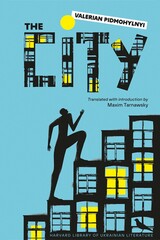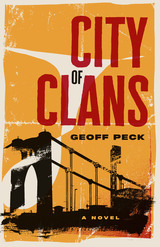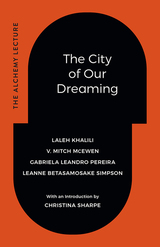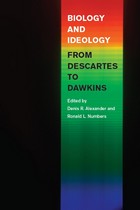
Over the course of human history, the sciences, and biology in particular, have often been manipulated to cause immense human suffering. For example, biology has been used to justify eugenic programs, forced sterilization, human experimentation, and death camps—all in an attempt to support notions of racial superiority. By investigating the past, the contributors to Biology and Ideology from Descartes to Dawkins hope to better prepare us to discern ideological abuse of science when it occurs in the future.
Denis R. Alexander and Ronald L. Numbers bring together fourteen experts to examine the varied ways science has been used and abused for nonscientific purposes from the fifteenth century to the present day. Featuring an essay on eugenics from Edward J. Larson and an examination of the progress of evolution by Michael J. Ruse, Biology and Ideology examines uses both benign and sinister, ultimately reminding us that ideological extrapolation continues today. An accessible survey, this collection will enlighten historians of science, their students, practicing scientists, and anyone interested in the relationship between science and culture.
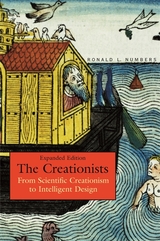
In light of the embattled status of evolutionary theory, particularly as "intelligent design" makes headway against Darwinism in the schools and in the courts, this now classic account of the roots of creationism assumes new relevance. Expanded and updated to account for the appeal of intelligent design and the global spread of creationism, The Creationists offers a thorough, clear, and balanced overview of the arguments and figures at the heart of the debate.
Praised by both creationists and evolutionists for its comprehensiveness, the book meticulously traces the dramatic shift among Christian fundamentalists from acceptance of the earth's antiquity to the insistence of present-day scientific creationists that most fossils date back to Noah's flood and its aftermath. Focusing especially on the rise of this "flood geology," Ronald L. Numbers chronicles the remarkable resurgence of antievolutionism since the 1960s, as well as the creationist movement's tangled religious roots in the theologies of late-nineteenth- and early-twentieth-century Baptists, Presbyterians, Lutherans, and Adventists, among others. His book offers valuable insight into the origins of various "creation science" think tanks and the people behind them. It also goes a long way toward explaining how creationism, until recently viewed as a "peculiarly American" phenomenon, has quietly but dynamically spread internationally--and found its expression outside Christianity in Judaism and Islam.
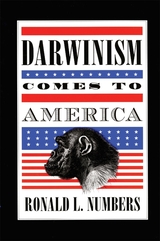
In 1997, even as Pope John Paul II was conceding that evolution was "more than just a theory," local school boards and state legislatures were still wrangling over the teaching of origins--and nearly half of all Americans polled believed in the recent special creation of the first humans. Why do so many Americans still resist the ideas laid out by Darwin in On the Origin of Species? Focusing on crucial aspects of the history of Darwinism in America, Ronald Numbers gets to the heart of this question.
Judiciously assessing the facts, Numbers refutes a host of widespread misconceptions: about the impact of Darwin's work on the religious ideas of scientists, about the character of the issues that exercised scientists of the immediate post-Darwin generation, about the Scopes trial of 1925 and its consequences for American schools, and about the regional and denominational distribution of pro- and anti-evolutionary sentiments.
Displaying the expertise that has made Numbers one of the most respected historians of his generation, Darwinism Comes to America provides a much-needed historical perspective on today's quarrels about creationism and evolution--and illuminates the specifically American nature of this struggle.

If we want nonscientists and opinion-makers in the press, the lab, and the pulpit to take a fresh look at the relationship between science and religion, Ronald Numbers suggests that we must first dispense with the hoary myths that have masqueraded too long as historical truths.
Until about the 1970s, the dominant narrative in the history of science had long been that of science triumphant, and science at war with religion. But a new generation of historians both of science and of the church began to examine episodes in the history of science and religion through the values and knowledge of the actors themselves. Now Ronald Numbers has recruited the leading scholars in this new history of science to puncture the myths, from Galileo’s incarceration to Darwin’s deathbed conversion to Einstein’s belief in a personal God who “didn’t play dice with the universe.” The picture of science and religion at each other’s throats persists in mainstream media and scholarly journals, but each chapter in Galileo Goes to Jail shows how much we have to gain by seeing beyond the myths.

A Guardian “Favourite Reads—as Chosen by Scientists” Selection
“Tackles some of science’s most enduring misconceptions.”
—Discover
A falling apple inspired Isaac Newton’s insight into the law of gravity—or did it really?
Among the many myths debunked in this refreshingly irreverent book are the idea that alchemy was a superstitious pursuit, that Darwin put off publishing his theory of evolution for fear of public reprisal, and that Gregor Mendel was ahead of his time as a pioneer of genetics. More recent myths about particle physics and Einstein’s theory of relativity are discredited too, and a number of dubious generalizations, like the notion that science and religion are antithetical, or that science can neatly be distinguished from pseudoscience, go under the microscope of history.
Newton’s Apple and Other Myths about Science brushes away popular fictions and refutes the widespread belief that science advances when individual geniuses experience “Eureka!” moments and suddenly grasp what those around them could never imagine.
“Delightful…thought-provoking…Every reader should find something to surprise them.”
—Jim Endersby, Science
“Better than just countering the myths, the book explains when they arose and why they stuck.”
—The Guardian

Contributions include Sally Gregory Kohlstedt, "Parlors, Primers, and Public Schooling: Education for Science in Nineteenth-Century America;" Margaret Rossiter, "'Women's Work' in Science, 1880-1910;" Philip J. Pauly, "The Development of High School Biology: New York City, 1900-1925;" Susan E. Lederer, "Political Animals: The Shaping of Biomedical Research Literature in Twentieth-Century America;" Stanley Goldberg, "Inventing a Climate of Opinion: Vannevar Bush and the Decision to Build the Bomb;" Daniel J. Kevles, "The National Science Foundation and the Debate over Postwar Research Policy, 1942-1945: A Political Interpretation of Science: The Endless Frontier;" David A. Hollinger, "Science as a Weapon in Kulturkämpfe in the United States During and After World War II;" and others.
These essays originally were published in Isis, a publication of the History of Science Society.
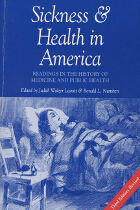
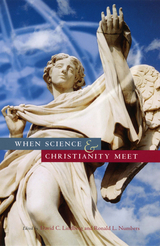
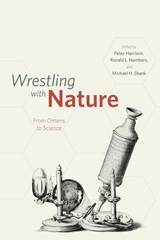
When and where did science begin? Historians have offered different answers to these questions, some pointing to Babylonian observational astronomy, some to the speculations of natural philosophers of ancient Greece. Others have opted for early modern Europe, which saw the triumph of Copernicanism and the birth of experimental science, while yet another view is that the appearance of science was postponed until the nineteenth century.
Rather than posit a modern definition of science and search for evidence of it in the past, the contributors to Wrestling with Nature examine how students of nature themselves, in various cultures and periods of history, have understood and represented their work. The aim of each chapter is to explain the content, goals, methods, practices, and institutions associated with the investigation of nature and to articulate the strengths, limitations, and boundaries of these efforts from the perspective of the researchers themselves. With contributions from experts representing different historical periods and different disciplinary specializations, this volume offers a fresh perspective on the history of science and on what it meant, in other times and places, to wrestle with nature.
READERS
Browse our collection.
PUBLISHERS
See BiblioVault's publisher services.
STUDENT SERVICES
Files for college accessibility offices.
UChicago Accessibility Resources
home | accessibility | search | about | contact us
BiblioVault ® 2001 - 2025
The University of Chicago Press



